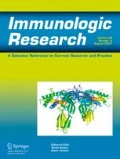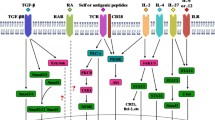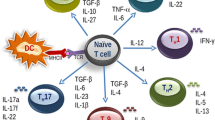Abstract
Aberrant T helper-2 (Th2) responses play a critical role in the pathogenesis of allergic diseases. The underlying mechanism is to be further investigated. It is reported that soluble CD83 (sCD83) has immune-regulatory effects. This study aims to investigate the role of sCD83 in the regulation of Th2 polarization. Blood samples were collected from pediatric patients with food allergy (FA). The Th2 response was analyzed by pertinent immunological approaches. An FA murine model was developed to test the role of sCD83 in the regulation of FA response. We found that the serum sCD83 levels were lower in FA patients. A negative correlation was detected between serum sCD83 levels and serum Th2 cytokine levels. The presence of sCD83 suppressed Th2 cell differentiation and antigen-specific Th2 cell activation. sCD83 upregulated the T-bet expression and suppressed the GATA3 expression in CD4+ T cells. Administration of sCD83 suppressed experimental FA. Pediatric FA patients have low serum sCD83 levels. Administration of sCD83 can alleviate experimental FA via suppression of aberrant Th2 polarization.







Similar content being viewed by others
References
Jones SM, Burks AW. Food allergy. N Engl J Med. 2017;377(12):1168–76. https://doi.org/10.1056/NEJMcp1611971.
Sicherer SH, Sampson HA. Food allergy: epidemiology, pathogenesis, diagnosis, and treatment. J Allergy Clin Immunol. 2014;133(2):291–307; quiz 8. https://doi.org/10.1016/j.jaci.2013.11.020.
Yu W, Freeland DMH, Nadeau KC. Food allergy: immune mechanisms, diagnosis and immunotherapy. Nat Rev Immunol. 2016;16(12):751–65. https://doi.org/10.1038/nri.2016.111.
Witkowski M, Witkowski M, Gagliani N, Huber S. Recipe for IBD: can we use food to control inflammatory bowel disease? Semin Immunopathol. 2018;40(2):145–56. https://doi.org/10.1007/s00281-017-0658-5.
Zhou H, Dai C, Pan J. Pediatric asthma and food allergy. Indian J Pediatr. 2017;84(8):585–90. https://doi.org/10.1007/s12098-017-2326-0.
Mastrorilli C, Caffarelli C, Hoffmann-Sommergruber K. Food allergy and atopic dermatitis: prediction, progression, and prevention. Pediatr Allergy Immunol. 2017;28(8):831–40. https://doi.org/10.1111/pai.12831.
Lee JB, Chen CY, Liu B, Mugge L, Angkasekwinai P, Facchinetti V et al. IL-25 and CD4(+) TH2 cells enhance type 2 innate lymphoid cell-derived IL-13 production, which promotes IgE-mediated experimental food allergy. J Allergy Clin Immunol. 2016;137(4):1216–25.e5. doi:https://doi.org/10.1016/j.jaci.2015.09.019.
Feng BS, Wu YJ, Hong JY, Geng XR, Liu JQ, Liu ZG, et al. Bcl2L12 plays a critical role in the development of intestinal allergy. Immunol Lett. 2018;203:87–94.
Yang PC, Xing Z, Berin CM, Soderholm JD, Feng BS, Wu L, et al. TIM-4 expressed by mucosal dendritic cells plays a critical role in food antigen-specific Th2 differentiation and intestinal allergy. Gastroenterology. 2007;133(5):1522–33. https://doi.org/10.1053/j.gastro.2007.08.006.
Piccioni M, Chen Z, Tsun A, Li B. Regulatory T-cell differentiation and their function in immune regulation. Adv Exp Med Biol. 2014;841:67–97. https://doi.org/10.1007/978-94-017-9487-9_4.
Fujimoto Y, Tedder TF. CD83: a regulatory molecule of the immune system with great potential for therapeutic application. J Med Dent Sci. 2006;53(2):85–91.
Huo S, Zhang J, Liang S, Wu F, Zuo Y, Cui D, et al. Membrane-bound and soluble porcine CD83 functions antithetically in T cell activation and dendritic cell differentiation in vitro. Dev Comp Immunol. 2019;99:103398. https://doi.org/10.1016/j.dci.2019.103398.
Chiang D, Chen X, Jones SM, Wood RA, Sicherer SH, Burks AW, et al. Single-cell profiling of peanut-responsive T cells in patients with peanut allergy reveals heterogeneous effector TH2 subsets. J Allergy Clin Immunol. 2018;141(6):2107–20. https://doi.org/10.1016/j.jaci.2017.11.060.
Zhang Y, Zhang Y, Gu W, Sun B. TH1/TH2 cell differentiation and molecular signals. Adv Exp Med Biol. 2014;841:15–44. https://doi.org/10.1007/978-94-017-9487-9_2.
Connett JM, Hunt SR, Hickerson SM, Wu SJ, Doherty GM. Localization of IFN-gamma-activated Stat1 and IFN regulatory factors 1 and 2 in breast cancer cells. J Interf Cytokine Res. 2003;23(11):621–30. https://doi.org/10.1089/107999003322558755.
Wu YJ, Song YN, Geng XR, Ma F, Mo LH, Zhang XW, et al. Soluble CD83 alleviates experimental allergic rhinitis through modulating antigen-specific Th2 cell property. Int J Biol Sci. 2020;16(2):216–27. https://doi.org/10.7150/ijbs.38722.
Karampoor S, Zahednasab H, Etemadifar M, Keyvani H. The levels of soluble forms of CD21 and CD83 in multiple sclerosis. J Neuroimmunol. 2018;320:11–4. https://doi.org/10.1016/j.jneuroim.2018.04.005.
Hock BD, O'Donnell JL, Taylor K, Steinkasserer A, McKenzie JL, Rothwell AG, et al. Levels of the soluble forms of CD80, CD86, and CD83 are elevated in the synovial fluid of rheumatoid arthritis patients. Tissue Antigens. 2006;67(1):57–60. https://doi.org/10.1111/j.1399-0039.2005.00524.x.
Li Z, Ju X, Lee K, Clarke C, Hsu JL, Abadir E, et al. CD83 is a new potential biomarker and therapeutic target for Hodgkin lymphoma. Haematologica. 2018;103(4):655–65. https://doi.org/10.3324/haematol.2017.178384.
Noval Rivas M, Burton OT, Wise P, Charbonnier LM, Georgiev P, Oettgen HC, et al. Regulatory T cell reprogramming toward a Th2-cell-like lineage impairs oral tolerance and promotes food allergy. Immunity. 2015;42(3):512–23. https://doi.org/10.1016/j.immuni.2015.02.004.
Raphael I, Nalawade S, Eagar TN, Forsthuber TG. T cell subsets and their signature cytokines in autoimmune and inflammatory diseases. Cytokine. 2015;74(1):5–17. https://doi.org/10.1016/j.cyto.2014.09.011.
Lundell AC, Andersson K, Josefsson E, Steinkasserer A, Rudin A. Soluble CD14 and CD83 from human neonatal antigen-presenting cells are inducible by commensal bacteria and suppress allergen-induced human neonatal Th2 differentiation. Infect Immun. 2007;75(8):4097–104. https://doi.org/10.1128/iai.01744-06.
Eckhardt J, Kreiser S, Dobbeler M, Nicolette C, DeBenedette MA, Tcherepanova IY, et al. Soluble CD83 ameliorates experimental colitis in mice. Mucosal Immunol. 2014;7(4):1006–18. https://doi.org/10.1038/mi.2013.119.
Yeo SH, Aggarwal B, Shantakumar S, Mulgirigama A, Daley-Yates P. Efficacy and safety of inhaled corticosteroids relative to fluticasone propionate: a systematic review of randomized controlled trials in asthma. Expert Rev Respir Med. 2017;11(10):763–78. https://doi.org/10.1080/17476348.2017.1361824.
Yu ZJ, Zeng L, Luo XQ, Geng XR, Xu R, Chen K, et al. Vitamin D3 inhibits micro RNA-17-92 to promote specific immunotherapy in allergic rhinitis. Sci Rep. 2017;7(1):546. https://doi.org/10.1038/s41598-017-00431-1.
Yang LT, Shu Q, Luo XQ, Liu ZQ, Qiu SQ, Liu JQ, et al. Long-term effects: galectin-1 and specific immunotherapy for allergic responses in the intestine. Allergy. 2018;73(1):106–14. https://doi.org/10.1111/all.13256.
Zhou CJ, Ma F, Liao WJ, Song LJ, Yu D, Song YN, et al. Restoration of immune suppressor function of regulatory B cells collected from patients with allergic rhinitis with Chinese medical formula Yupingfeng San. Am J Transl Res. 2019;11(3):1635–43.
Horvatinovich JM, Grogan EW, Norris M, Steinkasserer A, Lemos H, Mellor AL, et al. Soluble CD83 inhibits T cell activation by binding to the TLR4/MD-2 complex on CD14(+) monocytes. J Immunol. 2017;198(6):2286–301. https://doi.org/10.4049/jimmunol.1600802.
Lin W, Buscher K, Wang B, Fan Z, Song N, Li P, et al. Soluble CD83 alleviates experimental autoimmune uveitis by inhibiting filamentous actin-dependent calcium release in dendritic cells. Front Immunol. 2018;9:1567. https://doi.org/10.3389/fimmu.2018.01567.
Zinser E, Lechmann M, Golka A, Lutz MB, Steinkasserer A. Prevention and treatment of experimental autoimmune encephalomyelitis by soluble CD83. J Exp Med. 2004;200(3):345–51. https://doi.org/10.1084/jem.20030973.
Bock F, Rossner S, Onderka J, Lechmann M, Pallotta MT, Fallarino F, et al. Topical application of soluble CD83 induces IDO-mediated immune modulation, increases Foxp3+ T cells, and prolongs allogeneic corneal graft survival. J Immunol. 2013;191(4):1965–75. https://doi.org/10.4049/jimmunol.1201531.
Acknowledgments
This study was supported by a research grant from Shenzhen Nanshan District Pioneer Group Research Funds (No. LHTD20180007).
Author information
Authors and Affiliations
Contributions
WS, HL, and BJ performed the experiments, analyzed the research data, and reviewed the manuscript. ZW designed the project, supervised the experiments, and wrote the manuscript. All of the authors reviewed the manuscript.
Corresponding author
Ethics declarations
Conflict of interest
The authors declare that they have no conflict of interest.
Additional information
Publisher’s note
Springer Nature remains neutral with regard to jurisdictional claims in published maps and institutional affiliations.
Electronic supplementary material
ESM 1
(DOCX 101 kb)
Rights and permissions
About this article
Cite this article
Song, W., Li, H., Jia, B. et al. Soluble CD83 suppresses experimental food allergy via regulating aberrant T helper 2 responses. Immunol Res 68, 141–151 (2020). https://doi.org/10.1007/s12026-020-09133-9
Published:
Issue Date:
DOI: https://doi.org/10.1007/s12026-020-09133-9




